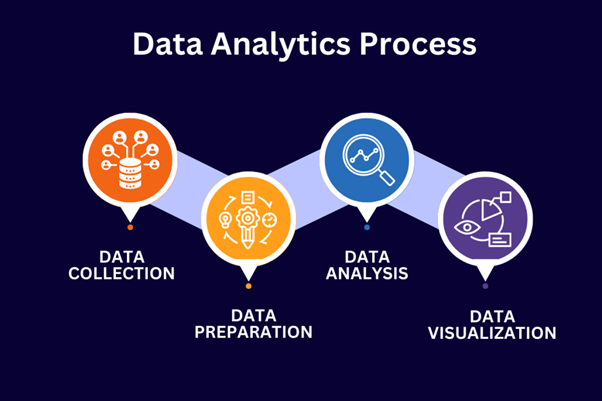Earning a degree in data analytics may open the door to a wide range of job options and career paths. While the programs offered at CTU may not directly lead to the specific careers discussed here, this group of articles is meant to give you useful information and help you decide which degree level and certifications best match your career goals.
Understanding Data Analytics
Data analytics is the process of studying and making sense of data to discover useful insights or patterns. This helps businesses and other groups improve their work and make better decisions. There are many types of jobs within data analytics. For example, some data analysts focus on solving problems in supply chains, while others look at customer data to help keep current customers and attract new ones. These are just a couple of examples—there are many more areas where data analytics can be used.
What Is a Data Analytics Degree Program?
There are different types of degree programs in data analytics. Some schools offer full programs in data analytics, while others offer degrees in areas like business or computer science that let students focus or specialize in data analytics. These programs are built to help students learn the skills and methods needed to prepare for a career in this field.
Comparing Data Analytics Degree Programs and Concentrations
Full Data Analytics Degree Programs
These programs focus on teaching both technical and communication skills used in collecting and understanding data. Students usually take courses in areas like data mining, managing data, predicting outcomes, and creating charts or visuals. If you’re working toward a bachelor’s degree, you’ll also take general education classes. Graduate programs, like a master’s or doctorate in data analytics, often do not include general education but may require a final project or thesis.
Degree Programs with a Focus in Data Analytics or Data Science
Some business degree programs let students choose a focus in data analytics. These programs include general education and business-related classes, along with specific courses that deal with data analytics. This path might work well for someone who wants to improve their overall business skills while also learning how data can affect decision-making.
Computer science programs may offer a concentration in data science or data analytics, too. These programs also include general education courses, but the main focus is on programming, algorithms, and operating systems. Students in these programs may study topics like machine learning, large databases, and data analytics tools.
For those who already have a bachelor’s degree and want to keep studying data analytics, graduate programs can be a good next step. A master’s or doctoral degree in data analytics will continue to focus mainly on understanding and using data. Business or computer science graduate programs that offer a concentration in data analytics will include related courses to support the main area of study.
The Difference Between Data Analytics and Data Science
Even though they are similar, data analytics and data science are not the same. Here’s a look at how the roles of data analysts and data scientists compare.
What Does a Data Analyst Do?
Data analysts are professionals who study data to find trends and provide helpful information. Some job titles that involve this type of work include operations research analysts, management analysts, and computer or information research scientists. Data analysts use special tools to examine large sets of data. They find patterns, make predictions, and create visuals to share their findings. Their work helps business leaders make better decisions.
What Does a Data Scientist Do?
Data scientists take a wider approach. They create models and systems to gather and study data. They often begin by finding the best sources of data using different methods. They use a mix of tools like data mining, machine learning, and natural language processing to understand both structured and unstructured data. Like analysts, they use visuals to clearly share what they’ve learned with coworkers and clients.
CTU Programs with Data Analytics Focus Areas
Bachelor of Science in Business Administration – Data Analytics
This program allows students to learn how data can be used to make better business decisions. The main courses focus on basic business knowledge and skills, while the data analytics concentration adds classes that teach how to organize data, find useful insights, and use that information to help a business spot risks and opportunities.
Bachelor of Science in Computer Science – Data Science
This program focuses on the basics of data analysis and the use of programming to create software solutions. Students learn about different software design methods and explore various skills and techniques that are important in developing computer software.
Master of Business Administration – Data Analytics
This program is for students who want to study how data affects business performance and decision-making. The main MBA classes cover essential business topics. The data analytics concentration allows students to learn how to use data to make decisions that improve business strategies.
Doctor of Computer Science – Big Data Analytics
This advanced program is designed for experienced computer science professionals, researchers, and consultants. It encourages students to think strategically and contribute to their field. The Big Data Analytics concentration focuses on how to use tools and methods to analyze large sets of raw data and find meaningful insights.
Other Career Paths That Use Data Analysis
Database Architects
These professionals design and build databases that support systems and software. Before starting a design, they research what a company needs. Then they create models and write the code to build the database. They also check the system for mistakes or problems. Their work may include:
- Working with other experts to understand what the business needs
- Creating data models and database layouts
- Building tools for computer modeling and simulations
- Studying data to find patterns or trends
- Reviewing customer or market data



